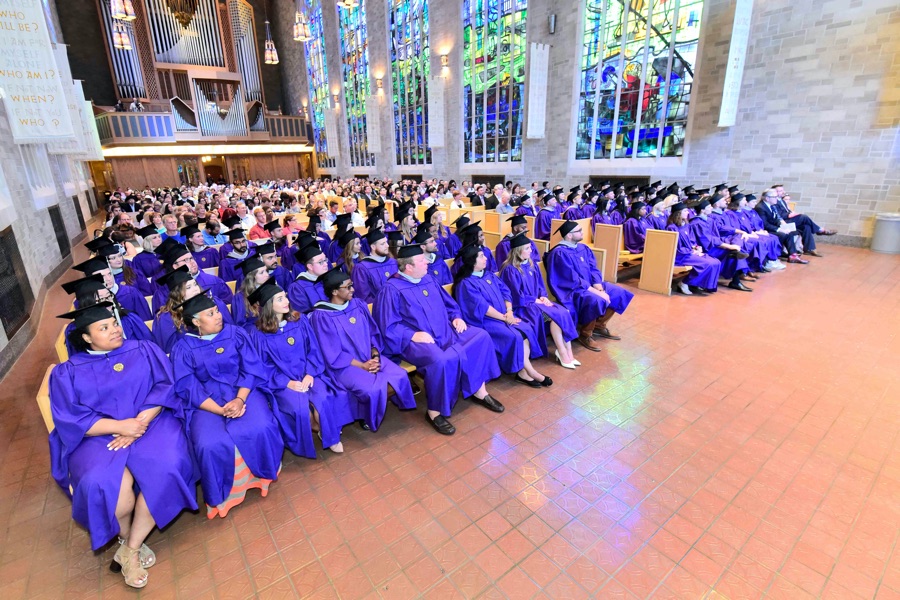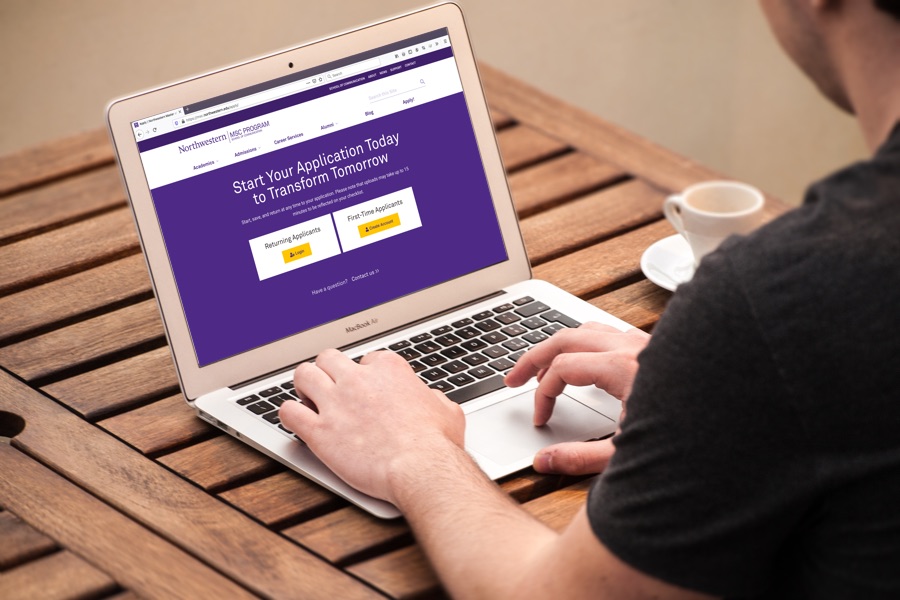Elevate Your Leadership. Expand Your Impact.
The MSC Online Leadership at Northwestern University helps experienced professionals sharpen their ability to drive strategy and lead through effective communication. Whether managing global teams, leading organizational change, or moving into executive leadership, Online Leadership offers the frameworks, mentorship, and network to elevate your impact. With faculty expertise and a powerful alumni community, graduates leave ready to translate insight into influence.
Build lasting career momentum through Northwestern’s MS in Communication— a program that blends leadership development, strategic communication, and a powerful community.
Receive ongoing support with a dedicated career coach available throughout the program to provide personalized advice and strategic guidance.
Immerse yourself with our deep dive approach, where you'll explore the concepts one class at a time.
Engage in 3 live-virtual seminars, where you'll collaborate with peers and learn from subject matter experts in real-time.
Complete your MS in Communication in under 12 months and advance your career in real-time.
 This action-oriented course builds participants’ collaborative leadership skills. Through a series of case studies, activities, and projects, students learn how to effectively lead collaboration among teams. The course explores the specific challenges associated with leading teams, including: building and designing teams, managing information exchange within and across teams, structuring effective group decision processes, igniting creative thinking, enabling complex problem solving, and managing team conflict.
This action-oriented course builds participants’ collaborative leadership skills. Through a series of case studies, activities, and projects, students learn how to effectively lead collaboration among teams. The course explores the specific challenges associated with leading teams, including: building and designing teams, managing information exchange within and across teams, structuring effective group decision processes, igniting creative thinking, enabling complex problem solving, and managing team conflict.

This course explores the new foundations of strategic communication, beginning with stakeholder identification and assessment. It then explores cases that demonstrate the ways the ways that external stakeholders can and should influence organizational processes and practices. Next it turns to cases that demonstrate how internal organizational processes and practices impinge on traditional public relations strategy. Finally, this class uses authentic corporate social responsibility communication as an ideal case that unites both forces.
 In this course, students study the use, collection, analysis, and application of information in organizational planning and decision-making. Particular attention is given to sampling methods, survey methodology, social media/website analytics, and focus groups. The goal is to produce students who make informed decisions when presented with organizational and market research.
In this course, students study the use, collection, analysis, and application of information in organizational planning and decision-making. Particular attention is given to sampling methods, survey methodology, social media/website analytics, and focus groups. The goal is to produce students who make informed decisions when presented with organizational and market research.
 In the age of big data, we increasingly need ways to present that data to persuade, inform, educate, and understand large volumes of information. Information design is an interdisciplinary field that tells us the stories of data, helping us to understand our increasingly complex world and share our conclusions with others. “Information” can be expanded beyond traditional data. Charts and visualizations to the information of physical spaces, software interfaces, publication design, and dashboards for diverse disciplines. While information design borrows from diverse fields like psychology, statistics, cartography, cognitive science, visual design and human machine interaction, there are a series of basic principles that make up the foundations of the field. At the conclusion of the class, students will have a solid understanding of how to secure and prepare data for visualization, how to choose a relevant visual framework to represent that data, and how to use principles of visual design to maximize comprehension, retention and appeal of those designs.
In the age of big data, we increasingly need ways to present that data to persuade, inform, educate, and understand large volumes of information. Information design is an interdisciplinary field that tells us the stories of data, helping us to understand our increasingly complex world and share our conclusions with others. “Information” can be expanded beyond traditional data. Charts and visualizations to the information of physical spaces, software interfaces, publication design, and dashboards for diverse disciplines. While information design borrows from diverse fields like psychology, statistics, cartography, cognitive science, visual design and human machine interaction, there are a series of basic principles that make up the foundations of the field. At the conclusion of the class, students will have a solid understanding of how to secure and prepare data for visualization, how to choose a relevant visual framework to represent that data, and how to use principles of visual design to maximize comprehension, retention and appeal of those designs.

The course provides a general introduction to the social scientific study of persuasive message design, emphasizing message, source, receiver, and contextual factors that either enhance or attenuate the effectiveness of strategic messaging. The course covers key factors that underlie human behavior change and discusses the ways in which behavioral change can be measured, analyzed, and validated. The larger purpose of the course is to provide a toolkit for thinking about how to influence behaviors through effective messaging. Additionally, students will put knowledge into practice, by completing an original research project that tests the effectiveness of a particular persuasive message.
 This course provides students with the concepts, insights, and techniques that will give them a competitive edge as they discover, diagnose and design networks. The course offers a set of strategic principles for students to create, maintain and dissolve network ties. These principles vary depending on a student’s desire to explore innovations, engage in entrepreneurship, exploit existing resources, implement change, or mobilize strategic partnerships. The course will identify the optimal principles in these diverse contexts using a set of case studies, review articles and computer-based visual-analytic demonstrations. By the end of the course, students will have the conceptual tools and techniques to assess an existing network and rewire them to achieve any desired individual or organizational goal.
This course provides students with the concepts, insights, and techniques that will give them a competitive edge as they discover, diagnose and design networks. The course offers a set of strategic principles for students to create, maintain and dissolve network ties. These principles vary depending on a student’s desire to explore innovations, engage in entrepreneurship, exploit existing resources, implement change, or mobilize strategic partnerships. The course will identify the optimal principles in these diverse contexts using a set of case studies, review articles and computer-based visual-analytic demonstrations. By the end of the course, students will have the conceptual tools and techniques to assess an existing network and rewire them to achieve any desired individual or organizational goal.
 Since the launch of ChatGPT in late 2022 generative AI has proliferated throughout society, capturing the imagination of the public with its potential to upend much of how people create and consume media and information. In this course we’ll demystify this new technology, understand how it works, how to control it through prompting, and how to implement it in various use cases found in media production and communication. We’ll also step back with a critical eye to ask questions of how generative AI changes the larger media system and raises ethical and governance issues around data, copyright, privacy, bias, and more.
Since the launch of ChatGPT in late 2022 generative AI has proliferated throughout society, capturing the imagination of the public with its potential to upend much of how people create and consume media and information. In this course we’ll demystify this new technology, understand how it works, how to control it through prompting, and how to implement it in various use cases found in media production and communication. We’ll also step back with a critical eye to ask questions of how generative AI changes the larger media system and raises ethical and governance issues around data, copyright, privacy, bias, and more.
 This course is an exploration of the ways in which communication can be more effectively used to exert influence and to exercise power — bringing together a variety of disciplines including rhetorical analysis, leadership theory, composition, speechwriting, and public speaking. The goal is to help students understand how the beliefs and behaviors of decision-makers and publics can be influenced by effective communication.
This course is an exploration of the ways in which communication can be more effectively used to exert influence and to exercise power — bringing together a variety of disciplines including rhetorical analysis, leadership theory, composition, speechwriting, and public speaking. The goal is to help students understand how the beliefs and behaviors of decision-makers and publics can be influenced by effective communication.
Lead with Purpose from Day One is a foundational seminar designed to help graduate students enter their program with intention, clarity, and a strong professional presence. Through guided reflection and interactive exercises, students will begin shaping a personal brand that highlights their unique strengths, leadership potential, and ability to navigate complex challenges. Emphasizing purposeful communication, strategic thinking, and collaborative leadership, this seminar equips participants to position themselves as professionals ready to make an impact across industries. Whether aspiring to lead in business, nonprofits, or innovation-driven fields, students will leave with a compelling narrative that sets them apart from day one.
Work today is being reshaped by artificial intelligence–whether in how we draft messaging, analyze information, or coordinate across teams. For leaders, the challenge is not mastering technical detail but guiding conversations about AI that influence workplace culture, build trust, and increase productivity.
This seminar introduces a practical framework for AI-mediated communication and builds essential leadership competencies: asking sharper questions about when and where AI belongs in workflows, recognizing the human choices embedded in AI systems, and facilitating discussions about evaluating opportunities and risks. Through cases, structured research frameworks, and interactive exercises, students will develop a personalized playbook that equips them to communicate AI with clarity, confidence, and credibility in their own organizations.
Organizational change management is about implementation of new ideas and practices. Because organizational change requires individuals and units to change, this seminar examines both how an individual’s attitudes and behavior might be altered and how an organization’s policies and practices might change. Consequently, topics will include persuasion, bargaining and negotiation, and organizational campaigns. This practical hands-on seminar will contain stories, tools, diagrams, cases, and worksheets to help you develop your skills as a change leader, able to take people outside their comfort zones and assess and address the toughest challenges.

“The MSC program was at once edifying and enlightening, beefing up existing skills and challenging with new approaches. This has had an immediate impact on how I do my daily work and it also has provided me with the knowledge, skills, and confidence to embrace more specialized pursuits when I leave corporate life and set out on my own.”
Head of Community Responsibility/President & CEO
MassMutual Foundation

Find out what you need to submit an application to the MSC program.

Learn more about the MSC program tuition and financial aid.

Begin your online application, save your progress, and return to complete at any time.
Embrace Change and Advance Your Career